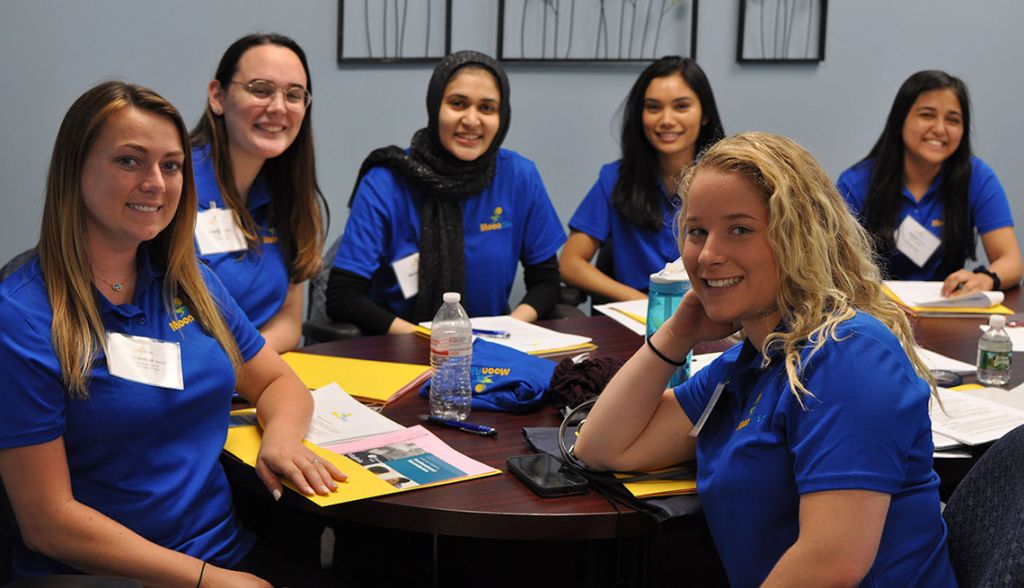
Becoming a CNA and gaining experience as a caregiver can improve your chance of being accepted to medical school. The pre-health internship program at Moon River Nursing Careers offers training to become a CNA and one-on-one experience working in home health. We are currently accepting applications for the 2019-2020 internship class and invite pre-med. college graduates to apply.
To apply, please call Julie at (703) 801-1180 or email enroll@moonrivernursingcareers.com to make an appointment to enroll in our upcoming class.
Learn more in the article “Five Ways to Gain Experience Without Shadowing” published by Association of American Medical Colleges.
“Gaining clinical experience is an important part of the medical school application. But to be a competitive medical school applicant, some have questioned if it’s necessary to shadow a doctor. It’s true that shadowing is great experience, as it exposes you to patient care in a clinical setting and gives you an idea of the day-to-day demands of a medical career. But as a pre-med student, you’re often balancing a rigorous academic schedule, along with extracurricular and personal responsibilities, so shadowing may not be a possibility.
When you apply to medical school, admissions committees look to see that your application conveys evidence of empathy, service orientation, ethical responsibility to self and others, an awareness of what a career as a practicing physician entails, as well as other characteristics and strengths. While shadowing may offer you exposure to the patient care environment, it’s not the only way to demonstrate these skills and attributes.
In a recent survey of medical school admissions officers conducted by the AAMC, 87% of survey respondents indicated that they accept an alternate activity instead of clinical shadowing.
So how else can you gain clinical experience? Here are five alternatives cited by admissions officers as other ways medical school applicants have gained clinical exposure and demonstrated the necessary skills sought in future doctors.
1. Hospice Volunteer
In a recent focus group conducted by the AAMC, medical students cited dealing with the death of a patient as a stressful time in their training. Spending time as a hospice volunteer may help you better understand the emotional toll of caring for a dying patient, and see first-hand how care providers interact with patients and their families. As an added benefit, hospices are usually staffed with counselors who can help you process your experiences as you serve. The Hospice Foundation of America can assist you with locating a facility in your area.
2. Certified Nursing Assistant (CNA)
Becoming a CNA is a great way to earn additional income and get hands-on practice while spending time in a clinical environment. CNA training programs vary in length, from four to sixteen weeks, and are offered by local community colleges, vocational schools, and the Red Cross. One benefit of working as a CNA is the flexible hours, so you may be able to work an evening or weekend shift that does not conflict with your classes or other activities.
3. Volunteer EMT
Serving as a volunteer emergency medical technician (EMT) is a great way to gain hands-on experience as an entry-level health care provider. Volunteer EMTs provide a needed service in their communities and are exposed to a variety of medical conditions. As an aspiring physician, you’ll become knowledgeable about the health care needs in your community and will gain exposure to the delivery of health care in various environments. Read an interview with two medical students about their experiences as EMTs and how it prepared them for medical school.
4. Hospital Scribe
A hospital scribe is usually a paid position found in the emergency department and assists the on-call physician with gathering information and making documentation. Working as a scribe is a unique opportunity to partner with a provider in the delivery of care and demonstrates to admissions officers that you’re skilled in oral and written communication. It also demonstrates that you can be a reliable and dependable member of a health care team. Read what a medical student shared about his experiences and what he learned as a medical scribe.
5. Caretaker
Serving as a caretaker for an ill family member can provide first-hand experience with the types of challenges patients can face when dealing with chronic illness, such as the costs of obtaining medication, the impacts of nutrition on patient health, and the difficulties of scheduling and attending medical appointments. Some students have developed empathy as they supported family members in this way, and have shared this experience on their application or personal statement.
No matter how you choose to gain clinical experience, it’s important to remember quality is more important than quantity. Admissions officers want you to not only show depth of experience and a longitudinal commitment to the work you choose, but also to be able to articulate how your medical exposure has informed your motivation for a career in medicine. You can learn more about each school’s policies regarding clinical experiences in the Medical School Admission Requirements (MSAR). It’s also a good idea to contact any medical school that you’re interested in to ensure that your planned activity meets their admission criteria.”






